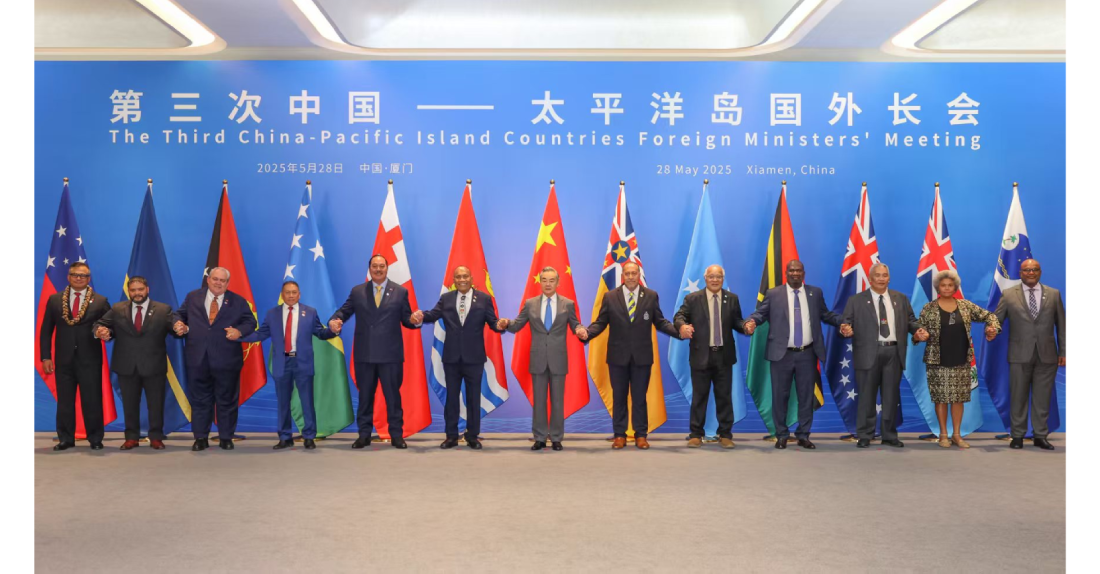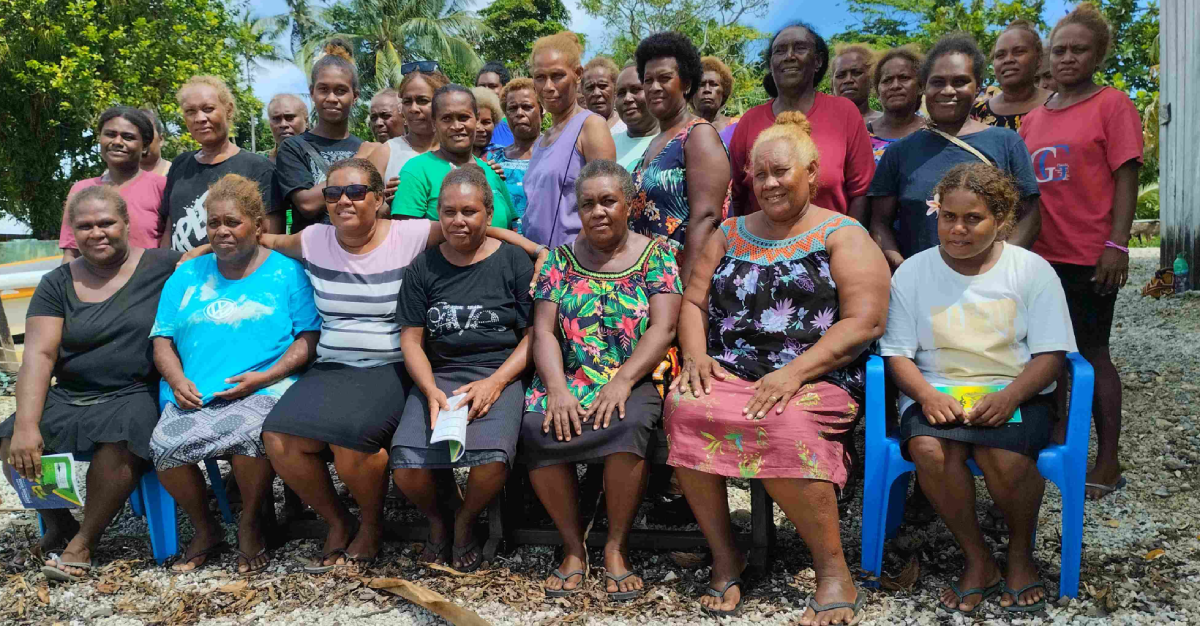On Thursday May 29, the Chinese Foreign Minister Wang Yi and his Pacific Islands counterparts/ representatives, after an in-depth exchange of views during the 3rd China-Pacific Island Countries’ Foreign Ministers’ Meeting in Xiamen City in China’s Fujian Province, issued a nine-point declaration reaffirming their commitment to deepening their comprehensive strategic partnership based on mutual respect and common development, and to building an even closer China-Pacific Islands Community with a shared future.
This declaration marks a new era of enhanced cooperation on issues of interest to both China and Pacific Island Countries, and amongst these issues is climate change, one of the major threats facing the wellbeing and survival of Pacific Islanders and moreover, highlights China’s ongoing collaborative efforts on the global arena in line with its vision to build an open, inclusive, clean and beautiful world of lasting peace, universal security and shared prosperity.
Though this meeting was the third Foreign Ministers’ Meeting between China and PICs, it was the first in-person meeting, and hence a crucial one, allowing Foreign Ministers/representatives from 11 PICs to engage in an in-depth exchange of views on issues with their Chinese counterpart to chart the way forward within the landscape of China-PICs relations.
Reference to climate change is found in point 6 and point 9 of the nine-point declaration.
Point 6 states that, “All parties agreed to continue to promote synergy between high-quality Belt and Road cooperation and the 2050 Strategy for the Blue Pacific Continent to make greater contributions to regional prosperity and development. All parties agreed to set cooperation priorities in accordance with each country’s national conditions within the China-Pacific Island Countries cooperation platforms and frameworks including on reserves of emergency supplies, climate action, poverty alleviation and development, disaster prevention and mitigation, Juncao technology, agriculture, and police training. All parties agreed to strengthen exchanges and cooperation in such areas as education, culture, tourism, health and media, and expand sub-national exchanges. All parties agreed to explore the economic viability of additional direct flights to Pacific Island Countries.”
Point 9 states, “All parties are fully aware of the significance of the management and conservation of the Pacific Ocean and its resources to the sustainable development of Pacific Island Countries, and acknowledge the vulnerability of Pacific Island Countries in the face of the adverse impact of climate change. All parties believe that the principles of equity, common but differentiated responsibilities and respective capabilities should be upheld, and agreed to jointly promote the full and effective implementation of the United Nations Framework Convention on Climate Change and its Paris Agreement. All parties call for advanced economies to provide leadership on climate change mitigation and resilience initiatives at the international level. China, within the framework of South-South cooperation, is committed to providing assistance and support to Pacific Island Countries’ climate response within its capabilities.”
Further to the nine-point declaration, the Chinese Ministry of Foreign Affairs issued a statement, affirming the following:
- China’s firm stand with PICs in upholding multilateralism, and commitment to work with PICs to build global climate governance system, featuring fairness, equity and win-win cooperation;
- China’s recognition of the United Nations Framework Convention on Climate Change (UNFCCC) and its Paris Agreement as the main channel and basic legal framework for international cooperation on climate change and commitment to the goals, principles and rules therein the convention, and that guided by the principles of equity, common but differentiated responsibilities and respective capabilities established in the convention, China will work with all parties for the sound implementation of the Convention and its Paris Agreement, and for a positive outcome of the 30th Session of the Conference of the Parties (COP30) to the Convention;
- China will enhance coordination and cooperation with PICs in the multilateral climate response process, and that China will encourage the international community to fully understand the special situation and concerns of developing countries, especially PICs on the issue of Climate Change;
- China will urge developed countries to earnestly fulfil their obligations and commitments, provide adequate funding, technology and capacity-building support to developing countries, particularly implement the decision adopted at the COP29 on the new collective quantified goal NCQG) for climate finance to jointly safeguard the legitimate rights and interests of developing countries, including PICs;
- China opposes unilateral restrictive measures and green trade barriers in the name of tackling climate change;
- China will support PICs in addressing climate change through sustainable development. It said fully recognizing the vulnerability of PICs’ economic and social development in the face of climate crisis, China will allocate $2million for further expansion of cooperation with PICs in areas such as clean energy, agriculture, fishery, ocean, low-carbon tourism and disaster prevention and mitigation to help PICs improve their energy structure, advance industrial upgrading, and strengthen capabilities in achieving the United Nations 2030 Agenda for Sustainable Development Goals so as to better respond to climate change;
- China will speed up the implementation of cooperation programs on climate change response. It affirmed that efforts will be made to promote the establishment of low-carbon demonstration zones, carry out capacity-building training programs to support PICs in cultivating professional personnel, and strengthen the leading role of South-South Cooperation projects in enhancing PICs’ capacity to address climate change;
- China will make full use of the China-PICs Climate Change Cooperation Center to enhance communication and cooperation with PICs, and continue to hold the China-PICs Climate Change Dialogue and Seminars on climate resilience building for PICs. It affirmed that in the next three years, China will conduct 100 small and beautiful projects for the local communities in PICs to help them improve climate resilience. It affirmed that China welcomes more PICs to join the international Zero-Carbon Island Cooperation Initiative;
- China will deepen cooperation with PICs on disaster prevention, mitigation and response. China supports the UN Early Warnings for All initiative, and will share early warning technologies and practices with PICs and provide high-frequency meteorological disaster monitoring through FENGYUN meteorological satellites, as set out in the China’s Action Plan on Early Warning for Climate Change Adaptation (2025-2027);
- China will strengthen disaster management cooperation with PICs under the China-PICs disaster management cooperation mechanism, and leverage the Center for Disaster Prevention and Mitigation Cooperation to provide disaster monitoring and early warning technology and services, post-disaster emergency supplies assistance, emergency humanitarian assistance and disaster assessment support, and establish demonstration communities of enhanced comprehensive disaster mitigation capacity, so as to improve climate resilience of PICs;
- China fully understands the importance of marine environment to PICs and will support PICs in protecting the marine ecological environment, improving the infrastructure and capacity to respond to sea level rising, coastal erosion and marine disasters, and carrying out studies and exchanges on the impact of sea level rising on islands;
- China will expand cooperation with PICs in such areas as the sustainable utilization of resources in coastal zones as well as the protection, restoration and governance of coastal zones;
- China will make full use of its technological and human resource strengths in marine environment observation and forecast, disaster early warning and the protection and restoration of marine ecological systems to help PICs with marine disaster prevention and mitigation; and
- China will support PICs in the sustainable development of fishery and offshore aquaculture and assist them in fostering a blue economy with climate resilience.

Point 6 and point 9 of the nine-point Declaration or Outcome of the Xiamen 2025 China-PICs Foreign Ministers’ Meeting issued on the evening of May 28 and co-related affirmations by Beijing on the issue of climate change on the same day speaks volumes of China’s growing leadership role in ensuring climate mitigation and resilience action in line with the United Nations 2030 Agenda for Sustainable Development and its own vision of building an open, inclusive, clean and beautiful world of lasting peace, universal security and shared prosperity.
China is resolute that all countries should uphold the goals, principles and frameworks set out in the UNFCCC and the Paris Agreement and implement the latter in full to ensure a fair and rational global climate governance system for win-win outcomes.
On the domestic front, China is making remarkable progress towards peaking its carbon dioxide emissions in key areas and sectors based on a series of supporting measures, including the 1+N Policy Framework. It is vigorously developing renewable energy and made great progress in planning and developing large wind power and photovoltaic bases in sandy areas, rocky areas and deserts.
By DELI-SHARON OSO
In Beijing, China




